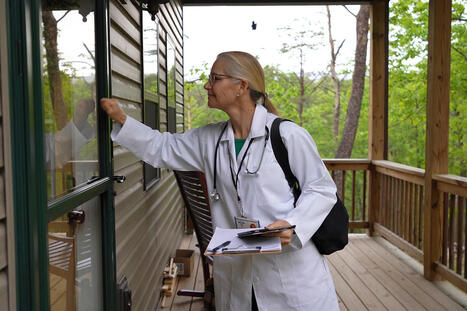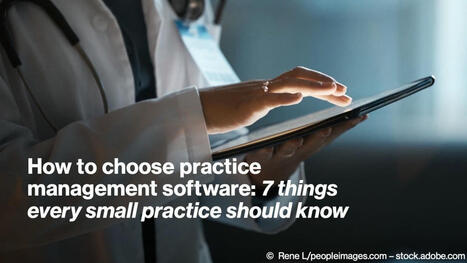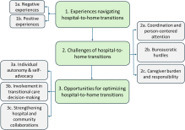 Your new post is loading...
 Your new post is loading...
Rural Americans face significant challenges in accessing primary care, but there are opportunities for policymakers and healthcare leaders to address these issues, according to a new issue brief from The Commonwealth Fund.
The Case Manager The US has the best ‘sickcare’ system in the world. Today, doctors and other healthcare professionals have numerous tools to keep people alive and treat them for complex conditions. One example is cancer care. Years ago, cancer was viewed as a terminal disease. Today, due to advances, cancer is now considered a | WorkersCompensation.com
The Case Manager In this week’s post, I wanted to let readers know that Case Management Week will take place from October 12th to 18th this year. While the official celebration runs from Oct. 12 to Oct. 18, the Case Management Society of America is recognizing case managers all month long with free and educational | WorkersCompensation.com
It's a growth industry, with a market value expected to exceed $63 billion by 2034
Oncology Nursing News connects oncology nurses and APPs with updates on therapy advances, side effect management, and patient-centered cancer care.
Case Management Focus The 79th Annual Workers Compensation Institute wrapped up on Wednesday, Aug. 20. I attended on Monday, Aug. 18 as a visitor to the exhibit hall. Over 2000 people, including worker compensation case managers, claims adjustors, physicians, attorneys, and employers, came together in Orlando at the Marriott World Center Hotel to learn, network, | WorkersCompensation.com
Among severely impaired and terminally ill nursing home (NH) residents, all-cause hospitalizations (ACH) and emergency department visits without hospitalization are common, and many are potentially avoidable.
According to a new study published by the National Bureau of Economic Research, more hospitals are purchasing private physician practices, which has led to reduced competition and higher healthcare prices. Here's what you need to know.
By addressing key challenges in healthcare, the U.S. can reduce administrative burdens, streamline regulations, promote advancements like AI, and improve access to care.
The Centers for Medicare & Medicaid Services (CMS) is once again proposing to eliminate the inpatient only list starting in January 2026, repeating the process they used back in 2021 by starting with orthopedic surgeries. Let me start by saying I agree the need for an inpatient only list is no longer present. Whether the […]
Dr. Colin Banas sees the broader context around medication management in the GLP-1 arena
As the principal frontline workers in health care, nurse managers require both sophisticated management abilities and the skills to navigate complex
For years, the triad model, comprised of nurse case managers, social workers, and utilization review nurses, served as the three-legged stool supporting the model for hospital case management. Designed in the 1990s to meet regulatory and inpatient care demands, it provided a structured, role-defined approach to patient care coordination. However, as healthcare systems face mounting […]
|
Implementing a new VBC program in healthcare requires cross-functional support and overcoming numerous challenges
Burn injuries are severe traumas causing serious complications and high mortality. Managing burns is especially challenging in resource-limited settings. This study explores burn care challenges from the perspectives of both patients and healthcare providers. This qualitative descriptive study was conducted in Iran (2024–2025) with 41 hospitalized burn patients and healthcare providers, including physicians, nurses, psychologists, physiotherapists, and nutritionists. Participants were purposively sampled, and data were collected through semi-structured interviews until saturation. Data were analyzed concurrently using Graneheim and Lundman’s content analysis method with MAXQDA 2020 for data management. An inductive data analysis process revealed two main categories and nine subcategories. The categories identified were: “Structural and Professional Barriers in Burn Management” and “Challenges Related to Burn Patients and their Families”. Key structural barriers include inadequate interprofessional collaboration, limited resources and specialized expertise in non-specialized centers, insufficient burn care education in health profession curricula, and a lack of attention to burn injuries in health policy. Patient- and family-related challenges include cultural and economic factors, insufficient post-discharge follow-up, and low public awareness about burn injuries. This study highlights the multifaceted challenges in burn management from both healthcare providers’ and patients’ perspectives. Addressing these interconnected challenges requires comprehensive strategies encompassing healthcare system reforms, enhanced education and training, culturally sensitive care approaches, and supportive policies. Such efforts are essential to improve patient outcomes, reduce long-term complications, and alleviate the substantial burden of burn injuries on individuals and the healthcare system.
Explore why nurse career advancement matters, using insights from two recent reports, to show how growth and recognition drive satisfaction.
A practice-ready nurse is one who can make consistent, effective clinical judgements, and know when to ask for assistance, says this nursing leader.
Healthcare organizations face ongoing challenges like burnout and inefficiency, but a shift towards integrated technology and collaboration offers hope for improvement.
From usability to integration, these key considerations can help you avoid costly mistakes.
Background Gender-based violence is a pervasive issue in Pakistan, necessitating effective interventions to enhance the responsiveness of healthcare workers’ capacity to respond effectively to Gender-based violence. This study aims to strengthen the health system’s response to Gender-based violence by implementing a need-based Life Skills-Based Training program for healthcare providers in Pakistan. Method A quasi-experimental pre-post study design was employed. The intervention, i.e., Life Skills-Based Training program was implemented across four diverse districts Matiari and Shadadkot (Sindh), Chitral (Khyber Pakhtunkhwa), and Gilgit (Gilgit-Baltistan) to ensure geographic and sociocultural variation. A total of 84 healthcare providers and 78 stakeholders were purposively selected based on their roles in patient care or Gender-based violence-related policymaking. Life Skills-Based Training was delivered over six days at each site, including tailored modules for healthcare providers and stakeholders, focusing on Gender-based violence concepts, screening, counseling, referral pathways, and system-level advocacy. A pre- and post-test assessment was administered to measure changes in knowledge, competencies, and attitudes using structured questionnaires adapted from UNHCR and UNICEF tools. Quantitative analysis of score improvements and qualitative feedback were used to evaluate training effectiveness. Results A comparative analysis of pre- and post-test assessments demonstrated significant improvements in participants’ Gender-based violence knowledge, awareness, and case management skills, with high satisfaction reported in Life Skills-Based Training evaluations. Feedback highlighted themes such as the effectiveness of training, the need for competent professionals, involving community leaders, replicating sessions, government health system responses, and integrating Gender-based violence education into curricula. Follow-up results demonstrated the sustainability of interventions, with participants actively applying their knowledge and leading community education. Conclusion The study highlights the need for continuous capacity-building and integrating Gender-based violence education into healthcare and educational systems to improve support for survivors. Strengthening the health workforce with targeted training and protocols is essential for addressing Gender-based violence effectively, offering a framework for similar efforts in other regions to foster equitable and responsive healthcare.
The transition from the structured environment of the hospital to the more independent home setting presents various challenges and opportunities that…
Background: Timely decision-making in complex arthroplasty cases such as prosthetic joint infections (PJIs) and periprosthetic fractures is critical to optimizing patient outcomes. Traditional weekly multidisciplinary team (MDT) meetings often delay these decisions. This study evaluates the use of Siilo (Doctolib Siilo, Amsterdam, NLD), a secure medical messaging app, to facilitate expedited MDT discussions in acute arthroplasty admissions.
Methods: A retrospective audit was conducted on acute arthroplasty cases discussed via the Siilo platform over 12 months in 2024. Patient demographics, American Society of Anesthesiologists (ASA) grades, and types of diagnoses were recorded. Time from referral to decision via Siilo was compared to the institutional average wait time for conventional MDT meetings. The primary outcome was time saved in days.
Results: A total of 97 acute arthroplasty admissions were included in the study, with a median age of 72 years. The average time to decision via Siilo was 0.87 days, resulting in a mean time saving of 3.03 days per case. Most patients had ASA grades of 2 or 3, and the most common diagnoses included knee PJI, periprosthetic femoral fractures, and hip PJI.
Conclusion: The Siilo messaging platform reduced time to MDT decision-making in acute arthroplasty cases, demonstrating a practical advantage in managing complex admissions. Secure messaging should be considered as a valuable adjunct to traditional MDT frameworks to enhance clinical efficiency and patient care quality.
Nurses are the backbone of the care team and key to systemic change—especially when equipped with evidence-based information.
CU Nursing is a sponsor of this year's National Nurse Practitioner Symposium. The conference focuses on learning and sharing guideline changes for primary care, collaborating on ideas, and networking.
Patients expect more involvement in their care. Including the patient on the care team, with shared evidence at the center, equips teams for more aligned decisions.
|




 Your new post is loading...
Your new post is loading...


























Rural challenges
Please also review AIHCP's Case Management Program